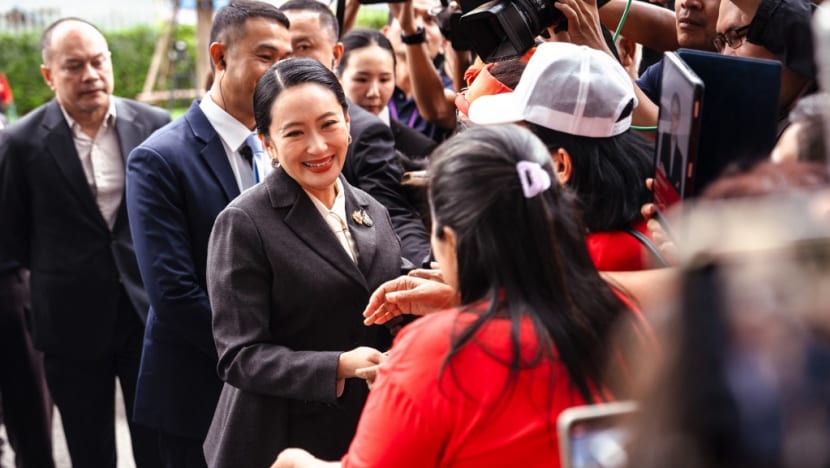Politics
Thai Constitutional Court Dismisses Prime Minister Paetongtarn

On August 29, 2024, Thailand’s Constitutional Court dismissed Prime Minister Paetongtarn Shinawatra over an ethics violation, marking a significant moment in the country’s turbulent political landscape. The ruling came after a controversial phone call between Ms. Paetongtarn, the daughter of former Prime Minister Thaksin Shinawatra, and Cambodian leader Hun Sen. This marks her removal as the sixth prime minister linked to the Shinawatra family or the Pheu Thai Party to be ousted since the military coup in 2006.
Judiciary and Military’s Role in Political Landscape
Analysts suggest that the ruling reinforces the dominance of Thailand’s royalist political elites, particularly the judiciary and military, in stifling any genuine attempts at reform. The power dynamics have resulted in political instability, distracting from economic growth and governance. Following the recent elections, the Pheu Thai Party, which came second to the progressive Move Forward Party, has struggled to present a coherent agenda amid ongoing uncertainty.
The implications of Ms. Paetongtarn’s dismissal highlight the extensive influence wielded by the nine judges of the Constitutional Court. Professor Pavin Chachavalpongpun, an expert in Southeast Asian Studies at Kyoto University, noted that this pattern of judicial intervention continues to erode public confidence in Thailand’s political system.
Impacts of the Hun Sen Connection
Adding to the political turmoil is the fallout from Ms. Paetongtarn’s communication with Hun Sen, which some insiders describe as politically naïve. The conversation’s leak has raised concerns about external influence in Thai politics. An insider from the Pheu Thai Party expressed frustration, stating, “It’s a disaster, this is basically a foreign country dictating what happens in Thai politics.” This relationship, once friendly, has now become a source of tension, particularly as nationalist sentiments rise in Thailand.
The fallout from this incident has been severe, leading to protests and even a border clash between Thailand and Cambodia that resulted in at least 40 fatalities. Diplomatic efforts, including a ceasefire brokered by ASEAN, have yet to fully stabilize the situation.
In the wake of Ms. Paetongtarn’s dismissal, the Bhumjaithai Party has emerged as a key player, engaging in talks to form a new coalition government. Party leader Anutin Charnvirakul has expressed confidence in resolving the ongoing issues, promising to restore stability and potentially leading the country into another election within four months. However, skepticism remains regarding whether a new election can break the cycle of instability that has characterized Thai politics for years.
As Thailand navigates this latest political crisis, it remains clear that the country’s traditional conservative elites hold considerable power, leaving the public and political analysts alike to ponder the future of its democracy.
-

 Lifestyle4 months ago
Lifestyle4 months agoHumanism Camp Engages 250 Youths in Summer Fest 2025
-

 Business5 months ago
Business5 months agoKenvue Dismisses CEO Thibaut Mongon as Strategic Review Advances
-

 Sports4 months ago
Sports4 months agoDe Minaur Triumphs at Washington Open After Thrilling Comeback
-

 Sports5 months ago
Sports5 months agoTupou and Daugunu Join First Nations Squad for Lions Clash
-

 Top Stories5 months ago
Top Stories5 months agoColombian Senator Miguel Uribe Shows Signs of Recovery After Attack
-

 World5 months ago
World5 months agoASEAN Gears Up for Historic Joint Meeting of Foreign and Economic Ministers
-

 Health4 months ago
Health4 months agoNew Study Challenges Assumptions About Aging and Inflammation
-

 Business5 months ago
Business5 months agoOil Prices Surge Following New EU Sanctions on Russia
-

 Entertainment4 months ago
Entertainment4 months agoDetaşe-Sabah Violin Ensemble Captivates at Gabala Music Festival
-

 Entertainment4 months ago
Entertainment4 months agoBaku Metro Extends Hours for Justin Timberlake Concert
-

 Top Stories5 months ago
Top Stories5 months agoRethinking Singapore’s F&B Regulations Amid Business Closures
-

 Business5 months ago
Business5 months agoU.S. House Approves Stablecoin Bill, Sends to Trump for Signature









